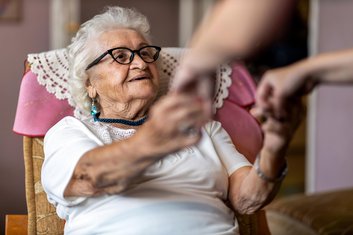
There is no right or wrong when it comes to when a person living with dementia should move into a care home, as everyone's personal circumstances and needs are different.
However, as a person's care requirements increase with the progression of their dementia, it is quite likely that their quality of life and their family's quality of life will benefit from care support. Within this article, we will discuss the different factors to be considered when deciding whether it is the right time to arrange care for your loved one living with dementia.
Factors to consider
Friends & family
Often, the family & friends of individuals living with dementia are their main carers. When deciding whether to move your loved one into a care home, it is essential to consider whether their primary caregiver (s) are able to effectively support and cope with their increasing care needs. If they are struggling, this may indicate that it is the right time to source a care home or home care for the individual. Understandably, this is an emotional decision for friends & family, and they may experience feelings of guilt or defeat, but it is vital for them to remember that they are making the decision with their loved ones' best interests at heart.
Respite care
It is crucial for main carers to remember to make time for themselves by taking a break from caring occasionally. A common concern for family and friends is how their loved one with dementia will respond to moving into a care home; it may be a good idea to arrange a short-term respite stay for them to test the waters and ease them into it gently. If the respite stay goes smoothly, it will give relatives the peace of mind that if the care becomes permanent, their loved one will be well cared for. Arranging regular respite care for a person living with dementia in the same care home could build familiarity and make the transition to permanent care easier for both them and you.
Living situation
Is your relative with dementia living by themselves or with a spouse who also has healthcare conditions? If this is the case and it is not a viable option for family and friends to step in to support, a care home might be the best and safest solution. As dementia symptoms progress, people can become forgetful, which can be incredibly dangerous if they are left unsupervised. For instance, they may forget to turn off the stove, leave doors unlocked or leave a tap running, which could have disastrous consequences. Care homes offer a safe and secure environment where your loved one will have trained carers around to support their needs and keep them out of harm's way 24/7.
Hospital admissions
Has your loved one with dementia had an increased number of visits to the hospital lately? This could be an indicator that their needs have increased and they are struggling to manage at home. It can be unsettling if you're constantly anticipating that call to say that they have had another tumble or found themselves in a situation. In a care home, there are carers on hand 24 hours a day to support residents' care needs and react quickly in the case of an emergency.
Benefits of moving into a care home
- In a care home, there will be carers on hand to support residents 24 hours a day providing friends and family with the peace of mind that if anything goes wrong, there is always a trained carer close by to help.
- Although rewarding, caring for someone who is living with dementia can be very stressful and tiring. Moving your loved one into a care home can take the pressure away from family members and prevent them from becoming unwell themselves.
- Care homes have other residents residing in them meaning that your relative will benefit from being in a social environment where they can interact with staff and fellow residents, many of whom will be a similar age to them.
- Care homes offer a safe environment for your loved one, particularly if the home is a 'secure' dementia home and has been adapted specifically for individuals who are living with dementia.
- If your loved one is residing in a care home, it means that you can appreciate more time together as you won't be tired from having the responsibility of being their full-time carer.
- A care home may be able to support your loved ones care requirements more effectively, providing them with a better quality of life.
Who should make the decision?
Providing they have the mental capacity, the person living with dementia may be capable of making the decision to move into a care home themselves.
Often, by the time they require additional care support, the individual with dementia's cognitive ability will have deteriorated to the point where they are no longer able to make decisions for themselves. In cases like these, it tends to be their Power of Attorney (POA), Lasting Power of Attorney (LPOA) or Personal Welfare Deputy who will make these decisions on their behalf. It is essential that the Attorney or the Deputy make decisions with the person's best interests at heart.
In cases where the individual living with dementia does not have a POA or Deputy in place, the decision as to whether the person moves into a care home will fall to health and social care professionals or people who are close to the individual.
It is important that the person with dementia is involved in the conversation where possible and given the opportunity to express their thoughts and feelings about the decision to move into a care home.
"I'm worried that my mother who is living with dementia will become unsettled if we move her into a care home. Are there any alternative care options?"
Yes! You will be pleased to hear that there are alternative options to moving your loved one into a care home, including:
Home care will enable your mother to continue living at home in a familiar environment while receiving support from a home care company. Home care can be tailored to the person's unique care needs, allowing you to decide how many visits you would like and at what times. For instance, if you struggle to get your loved one in and out of bed, you could arrange for a daily morning and evening call where caregivers can provide support.
Another benefit of home care is that you can still have an active part in the person's care, just with some additional assistance to ensure that their needs are being met effectively.
If you're finding being a full-time Carer for someone with dementia too much, you may like to look into arranging regular respite care for your loved one, which will give you a well-needed break and allow you to recharge your batteries. Respite care can be provided in a care home setting or in your own home, with the support of home care visits or live-in care.
"How do I find out whether my aunt with dementia will need a care home or a nursing home?"
To find out whether your aunt will require a care home or a nursing home, you will need to contact your local authority to arrange a Care Needs Assessment. The Care Needs Assessment will assess your aunt's care requirements and the level of support she will require, i.e residential or nursing.
Read more about the difference between a care home and a nursing home.
"My father no longer has the mental capacity to make informed decisions due to his dementia, will I need Power of Attorney (POA) to choose a care home for him?"
Not necessarily; if you are the POA for your father, you will have the legal power to decide whether it would be best for him to move into a care home. However, if you are not your father's POA, it will fall to healthcare professionals to assess his needs and decide the best course of action - they will keep the family involved through a 'best interests' meeting. Along with the healthcare professionals, you can help decide on the homes you feel are most suitable.
Discover more about what a Power of Attorney is.
"My mother is living with dementia and her needs have increased to the point we can no longer care for her but we are concerned that we will not be able to afford care home fees. Is there any funding support available?"
Absolutely! Firstly, you will need to speak with your local authority to arrange a Financial Assessment for your mother. They will assess her assets and determine whether she is eligible for local authority funding. Currently, if she is assessed as having assets below £23,250, she will be eligible for part funding, and if she is assessed as having assets below £14,250, she will be eligible for full council funding.
If your mother is assessed as having over £23,250 in assets, she will be required to self-fund her care. Find out more about care home costs here.
Are you looking for a care service for a loved one? TrustedCare's team of Care Advisers can help with your search!
Call us on 01865 680331
Send message

